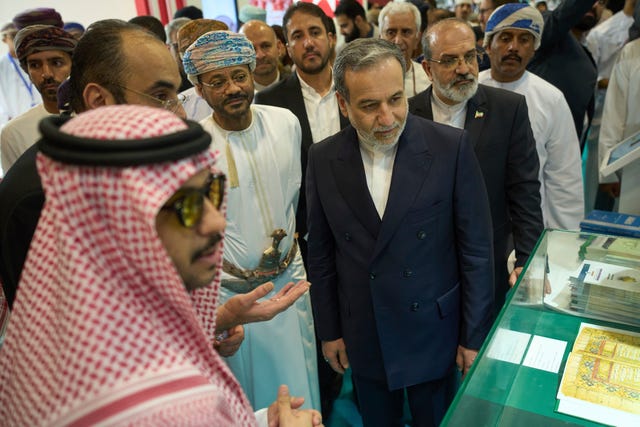Iran and US begin expert talks in Oman over Tehran’s nuclear programme
US President Donald Trump has repeatedly threatened to unleash air strikes targeting Iran’s programme if a deal is not reached.

Iran and the United States have begun in-depth negotiations in Oman over Tehran’s rapidly advancing nuclear programme, talks that are likely to hinge on the Islamic Republic’s enrichment of uranium.
Iranian state television reported the talks had begun in Muscat, the mountain-wrapped capital of the sultanate on the eastern edge of the Arabian Peninsula.
However, neither Iranian foreign minister Abbas Araghchi nor US Middle East envoy Steve Witkoff offered any immediate specifics or details on the talks that they will lead.

Mr Araghchi arrived on Friday in Oman and met with Omani foreign minister Badr al-Busaidi, who has mediated the two previous rounds of talks in Muscat and Rome.
Mr Araghchi then visited the Muscat International Book Fair, surrounded by television cameras and photojournalists.
Video late on Saturday morning showed Mr Araghchi heading to the talks.
Mr Witkoff was in Moscow on Friday meeting Russian President Vladimir Putin.
He arrived on Saturday in Oman, a source familiar with Mr Witkoff’s travels told The Associated Press.
The talks seek to limit Iran’s nuclear programme in exchange for the lifting of some of the crushing economic sanctions the US has imposed on the Islamic Republic closing in on half a century of enmity.
US President Donald Trump has repeatedly threatened to unleash air strikes targeting Iran’s programme if a deal is not reached.
Iranian officials increasingly warn that they could pursue a nuclear weapon with their stockpile of uranium enriched to near weapons-grade levels.
Iran’s 2015 nuclear deal with world powers did limit Tehran’s programme.
However, Mr Trump unilaterally withdrew from it in 2018, setting in motion years of attacks and tensions.
The wider Middle East also remains on edge over the devastating Israel-Hamas war in the Gaza Strip.
Mr Trump, travelling to Rome for the funeral of Pope Francis, again said he hoped negotiations would lead to a new nuclear deal.
However, he still held out the possibility of a military strike if they did not.
“The Iran situation is coming out very well,” Mr Trump said on Air Force One.
“We’ve had a lot of talks with them and I think we’re going to have a deal. I’d much rather have a deal than the other alternative. That would be good for humanity.”
He added: “There are some people that want to make a different kind of a deal – a much nastier deal – and I don’t want that to happen to Iran if we can avoid it.”
While Mr Araghchi and Mr Witkoff are again expected to speak through the Omanis, experts on both sides will also begin negotiating details of a possible deal.
From the Iranian side, Iranian deputy foreign minister Majid Takht-e Ravanchi will lead Tehran’s expert team, said Mohammad Golzari, an Iranian government official.
Mr Takht-e Ravanchi took part in the 2015 nuclear talks.
The US technical team will be led by Michael Anton, the director of US secretary of state Marco Rubio’s policy planning staff.
Mr Anton does not have the nuclear policy experience of those who led America’s efforts in the 2015 talks.
Iran has insisted that keeping its enrichment is key.
But Mr Witkoff has muddied the issue by first suggesting in a television interview that Iran could enrich uranium at 3.67%, then later saying that all enrichment must stop.
That demand that all enrichment stop has also been repeated by Mr Rubio.
However, Iranians remain hopeful the talks could be successful, as the Iranian rial has rebounded from historic lows during which it took more than one million rial to buy one US dollar.
“It’s OK to negotiate, to make the nuclear programme smaller or bigger, and reach a deal,” Tehran resident Farzin Keivan said.
“Of course we shouldn’t give them everything. After all, we’ve suffered a lot for this programme.”





